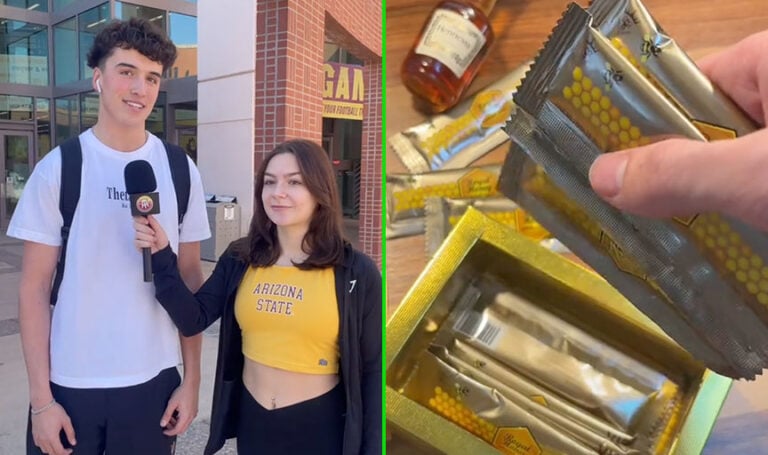Health experts urge male college students to stay away from honey packets that enhance sexual performance

Colleges and universities tend to be places where young people can explore their sexuality and try out new things—ideally, in a safe, consensual, and healthy environment. However, they also often happen to be the places where a number of different sexual faux pas go down. And, in the case of a recent viral sex trend sweeping US college campuses, some of these mishaps can even turn dangerous.
According to the New York Post, male students in the US are consuming “honey packets” that have been labelled and marketed as sexual enhancers. However, given the product’s list of natural ingredients, some health professionals are warning students to stay away from this new trend.
Specifically, The Food and Drug Administration (FDA) has issued several warnings about multiple honey packet brands, citing hidden drug ingredients in the product and urging consumers to be careful about what they’re ingesting, as reported by USA TODAY. This caution is especially prevalent if any students then plan to mix the packet with alcohol, a common theme seen in popular TikTok videos promoting the sexual stimulant.
Investigations by the FDA have proved that the formula of these honey packets contains a number of nefarious pharmaceutical drugs. For example, drugs such as sildenafil can cause dangerous side effects, including sudden blood pressure spikes, chest pain, vision changes, and even heart attacks.
The conversation regarding the honey packets really took off after one TikTok video involving students from Arizona State University went viral.
The clip, which was posted on 23 November 2024 and is currently sitting at 448,000 views, featured an interviewer asking male students “What is one thing that would send a BYU student into a coma that we do here at ASU?” For context, Brigham Young University (BYU) is a private religious university in Utah, predominantly attended by Mormon students.
The first male respondent promptly replied “probably taking honey packets,” while another male student revealed that he’d once taken four honey packets in one night.
While sexual enhancers can be safe, they’re typically only used by older men who struggle with erectile dysfunction (ED). Therefore, some are speculating that young students taking honey packets are engaging in the trend more so due to sexual pressure or anxiety.
Dr. Jesse Mills, a health science clinical professor and the director of the Men’s Clinic at the University of California, Los Angeles, told USA TODAY: “For a college student, if they already are having difficulty achieving an erection and maintaining it for intercourse, then that’s a big health problem that needs to be addressed. But if they think that it’s just going to help them last longer, help them party harder, then it’s probably not going to work unless they really believe in it—in which case, anything works, because the placebo effect is incredibly powerful.”
So, while students might be tempted to jump on this trend and join the others, it’s important to consider the legitimate long-term health effects these packets could have. Safety first, people.





